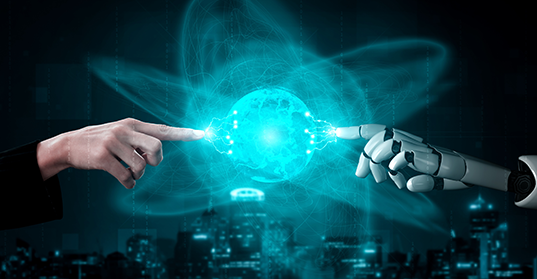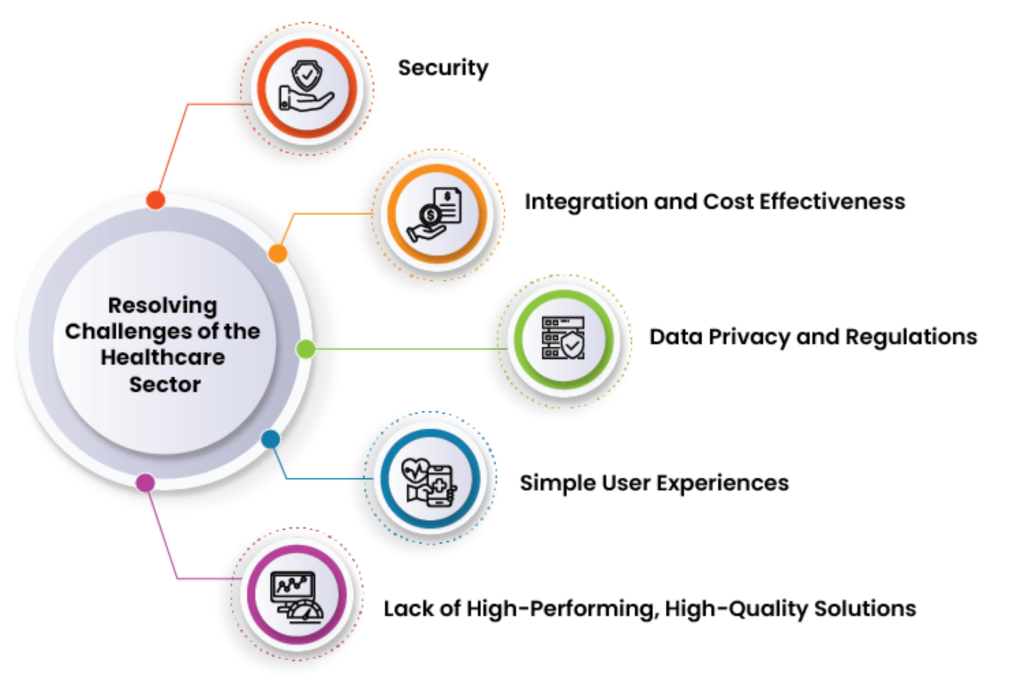

ACL Digital
Smart Healthcare: A New Way for Intelligent Health Environment
Emerging technologies like artificial intelligence (AI) and machine learning are transforming almost all industries, healthcare industry is one of them. Such technologies are being used in all phases of the value chain, enhancing medical diagnosis and treatment, as well as medication and vaccine research, therefore they are increasing efficiency throughout the entire healthcare system.
As per World Health Organization’s report, “Sharp increases in government spending on health at all country income levels underpinned the rise in health spending to a new high of US $9 trillion (approximately 11% of global GDP)”
In the healthcare industry, situations are evolving at a fast pace, such as growing breeds of viruses that are resulting in horrible infections, e.g. COVID-19. By that very fact, the evolution in pharmaceuticals is needed to counter such terrible infections. AI has just started to play a major role in the area of healthcare.
The art of reproducing human intelligence and behaviors using computers is known as artificial intelligence, or AI as it is more appropriately called. Additionally, it teaches computers to learn human behavior and make judgments that are similar to those of humans. All industries, academies, and the government have given AI a lot of attention.
Challenges Healthcare Industry Has Started to Counter
AI is changing the way people communicate, get information, and make purchases across various industries. In healthcare, it’s transforming the patient experience, the way doctors practice, and the operations of the pharmaceutical sector.
The journey has just begun to resolve few of the challenges such as –
- Security
- Integration and Cost Effectiveness
- Data Privacy and Regulations
- Simple User Experiences
- Lack of High-Performing, High-Quality Solutions

How AI and Machine Learning Will Take Healthcare to the New Heights?
AI and machine learning are revolutionary services that are all set to transform the healthcare sector and make it more precise and accessible. Such technology will also help the healthcare industry to overcome the complex challenges and rising global health. When combined with the potential of genetics and artificial intelligence, healthcare will advance to a new level. Specifically for diseases and conditions that impact people differently, and occasionally even completely, the transition will be achieved by AI to produce new digital biomarkers.
Apart from that AI and automation helps in –
- Operating leverage for healthcare institutions
- Enhancing efficiency and improving outcomes
- Potentially transform healthcare delivery
- Increasing the supply and scalability of healthcare professionals
AI algorithms are often more accurate and cost-effective than human doctors in scanning medical imaging data for early signs of illnesses like cancer. Millions of lives can be saved due to early detection of diseases and with more efficient treatment.
To avoid unforeseen outcomes, it is important to plan ahead. To achieve this, these models must be developed and implemented with safety and people in mind. It’s important to firmly address technical issues including privacy, bias, and dependability. For Responsible Healthcare General Intelligence to be successful, it is essential to cooperate with key ecosystem players to certify models and create governance frameworks.
The idea of a healthy world, supported by artificial intelligence and machine learning, is within our reach as we stand on the cusp of this fascinating new frontier. With the use of these technologies, we will be able to address medical problems with a level of agility and precision never before possible, which has the potential to revolutionize our understanding of world health. By wisely and ethically utilizing AI and machine intelligence, we may create a future in which access to high-quality healthcare is a basic right for everyone rather than a privilege for the few.
Healthcare is now heading toward the correct way thanks to the technical advancement moved from the restrictions of only being able to see images through chemical processes and film to permitting accessible, endless photos through small, simple digital cameras.
The Benefits of AI in Healthcare
AI in healthcare is already enhancing convenience and efficiency, lowering costs and errors, and generally making it simpler for more patients to access the healthcare they require. Few of the examples are self-service for patients, chat bots for quick resolutions, computer-aided detection (CAD) systems for easy diagnosis, and image data analysis to identify candidate molecules in drug discovery.
Although NLP and ML are being utilized in healthcare, their importance will grow due to their ability to:
- Boost efficiency and quality of service for clinicians and providers
- Improve patient involvement in their own treatment, and make it easier for patients to get care
- Quicken and lower the price of developing novel medicinal therapies
- Individualize medical care by utilizing analytics to harvest large, largely untapped reservoirs of uncodified clinical data.
While each AI technology has a considerable value to offer on its own, their combined use across the full patient experience, from diagnosis to treatment to continuous health care, offers a greater potential.
Real-world Use Cases of Intelligent Healthcare
AI has the potential to create an intelligent healthcare environment and support healthcare professionals in enhancing patient experience. It can boost output and care delivery efficiency, enabling healthcare systems to serve more patients with more effective treatment. AI can assist healthcare professionals have a better experience, allowing them to spend more time providing direct patient care and lowering stress.
Early diagnosis and treatment
AI-powered healthcare systems are capable of accurately analyzing medical images like X-rays and CT scans, which may eliminate the need for human interpretation. In order to find patterns and trends that might be needed in diagnosis and treatment choices, AI is also being used to evaluate huge volumes of patient data, such as electronic health records.
The most well-known example of this is IBM’s Watson Health, which analyzes patient data using ML (Machine Learning) capabilities and natural language processing to offer customized treatment suggestions to the doctors.
By enhancing the precision and efficiency of diagnoses as well as the efficacy of treatment regimens, the use of AI in the healthcare industry has the potential to completely transform the industry. While there are still issues to be resolved, such as data protection and governmental permission, there is no denying that AI has the potential to revolutionize healthcare. The future of AI in healthcare appears bright.
Electronic health record systems
The paper charts are converted to digital format via an electronic health record (EHR) system. Electronic health records are thought to be more effective, accessible, and efficient than the paper counterparts that patients have grown accustomed to.
EHR systems are there to keep track of individuals’ medical and treatment histories, giving a more comprehensive picture of their health. Records may be disclosed to approved service providers, including doctors, pharmacists, labs, hospitals, emergency rooms, and more.
Knowing which types are on the list is important when creating an EHR system. These types consist of:
- Physician/Doctor hosted
- Remotely hosted
- Subsidized
- Dedicated
- Cloud
Robotic process automation
Robotic process automation (RPA) executes organized digital tasks for administrative needs, i.e. those requiring information systems, as though they were being carried out by a human user who was following instructions or guidelines. They are less costly, simpler to program, and more transparent than other types of AI.
To perform like a semi-intelligent user of the information systems, RPA combines workflow, business rules, and ‘presentation layer’ integration. They are employed in the healthcare industry for routine duties including billing, prior authorization, and patient record updates. They may be used to extract data from, say, faxed photographs and feed it into transactional systems when paired with other technologies like image recognition.
Patient engagement and observance
Patient involvement and observance is the ultimate challenge between ineffective and positive health outcomes and considered as the “last mile” challenge in healthcare. The results are better in terms of utilization, financial results, and patient experience the more patients actively participate in their own health and treatment. AI and big data are progressively being used to overcome these issues. When creating a plan of care for an acute or chronic patient, providers and hospitals frequently draw on their clinical experience.
Related Insights


Revolutionizing Industries with IoT, AI, and Digital Twin Technologies

Exploring the Complexities and Security Threats in Artificial Intelligence

The Impact of AI in Frontend Development: Tools, Techniques, & Integrations

Generative AI: Leading the Charge in Healthcare Delivery

